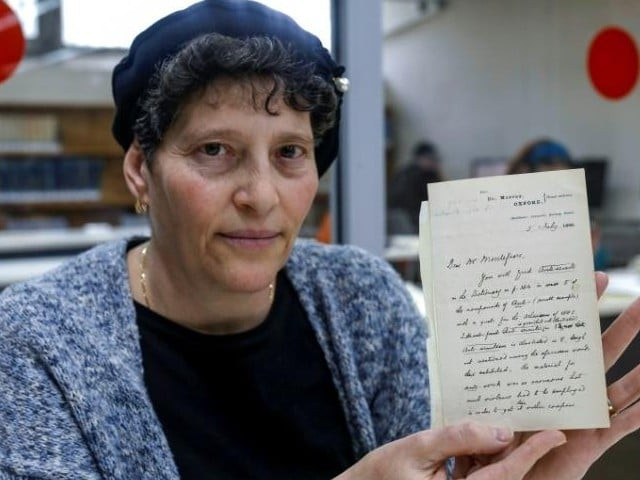First dictionary editor thought term 'anti-Semite' would have no use
British lexicographer James Murray planned several dedicated entries of words beginning with the pre-fix "anti"

Archivist at the National Library of Israel Rachel Misrati displays a letter dated 1900 by Oxford English Dictionary editor James Murray. PHOTO: AFP
A short-lived term unlikely to have use in the future: that was how the first editor of the Oxford English Dictionary viewed "anti-Semite", recently uncovered archival documents show.
Celebrated British lexicographer James Murray, who with his team began working on the first OED in 1879, planned several dedicated entries of words beginning with the pre-fix "anti".
But when a prominent member of Britain's Jewish community, Claude Montefiore, learnt that "anti-Semite" and its derivative terms would not have an entry, he wrote to Murray expressing concern.
Murray replied to Montefiore on July 5, 1900, as the original OED was being published in instalments -- a process that ran from 1884 to 1928.
Oxford Dictionary updates 'Yid' definition to include Tottenham fans
In Murray's letter -- recently uncovered by Israel National Library archivist Rachel Misrati -- he noted that the term anti-Semite had only migrated from German to English in 1881 and did not look likely to take hold given its limited usefulness.
"Anti-Semite and its family were then probably very new in English use, and not thought likely to be more than passing nonce-words," Murray wrote, indicating he had initially thought the term had been coined to articulate a fleeting phenomenon.
"Hence they did not receive treatment in a separate article," he added, arguing in the letter's post-script that "the man in the street would have said Anti-Jewish."
"Anti-Semitic has however a flavour of the professor about it, not of the penny-a-liner, & looks like the perpetration of some Viennese pundit," wrote Murray, who was schoolteacher before undertaking the groundbreaking OED project.
'Semitic' vs 'Jewish'
Misrati came across the letter while working on an article about British autographs in the National Library's Schwadron Collection, which contains some 40,000 autographs and portraits.
She told AFP that the correspondence between Montefiore and Murray shows that Britain's Jewish community was concerned about anti-Semitism "even though for the Jews in England -- compared to many other countries -- they were in a very good position."
Murray's letter also shows how the descriptor "Semitic", which technically refers to speakers of Hebrew, Arabic and Aramaic, was already at an early stage being applied only to Jews.
Oxford English Dictionary may go out of print
"Anti-Semitism in the beginning was against the Semitic races, so he's placing it in its anti-Jewish context," she said. "It's a missing link in the chain of history."
Murray's letter reveals his evolution in thinking and said that by 1900 he had doubts that leaving anti-Semite out of the OED was the right decision.
"Would that anti-Semitism had had no more than a fleeting interest!" he wrote.
He told Montefiore that he had hoped the liberal revolts that swept across Europe in 1848 indicated the continent "had left ignorance, suspicion and brute force behind us."
But with those liberal, progressive movements largely beaten back by the end of the century, Murray lamented "how the devil must have chuckled at our foolish dreams."
"The closing years of the 19th c. have shown, alas! that much of Christianity is only a temporary whitewash over brutal savagery," he wrote.
"It is unutterably saddening to one like myself who remembers '48 and the high hopes we had in the fifties."
"Probably if we had to do that post now, we should have to make Anti-Semite a main word," Murray wrote.




1726734110-0/BeFunky-collage-(10)1726734110-0-208x130.webp)














COMMENTS
Comments are moderated and generally will be posted if they are on-topic and not abusive.
For more information, please see our Comments FAQ